#deaf culture
Text
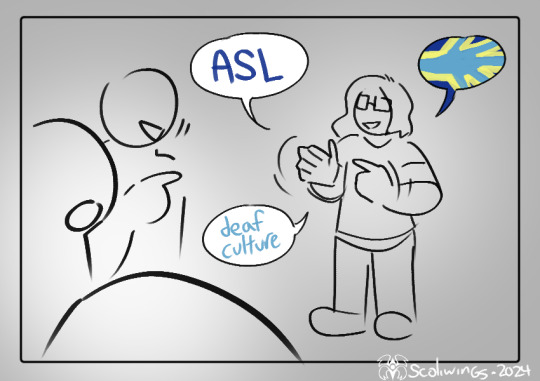
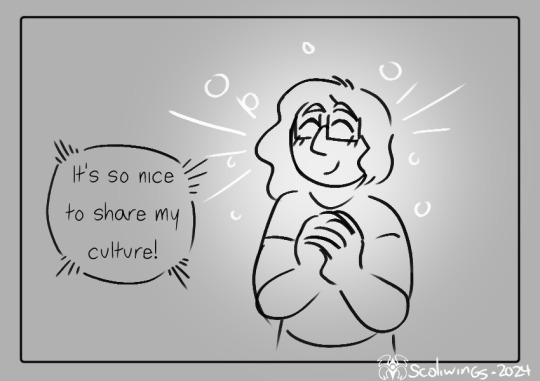

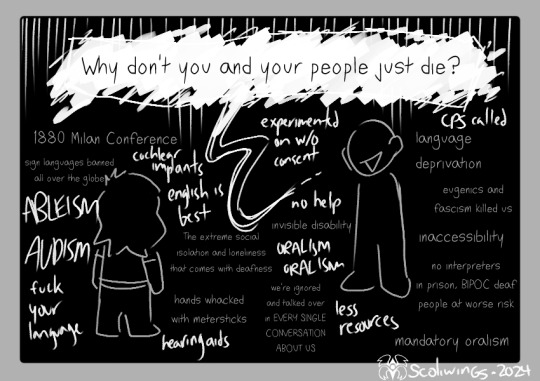
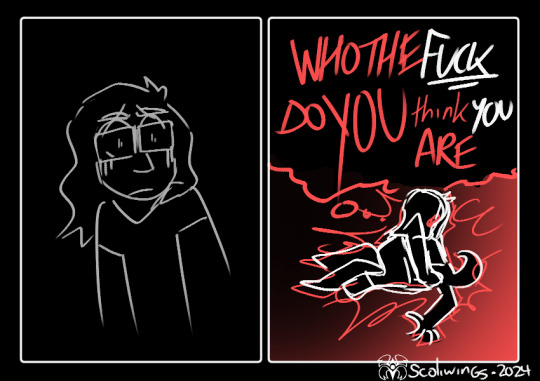
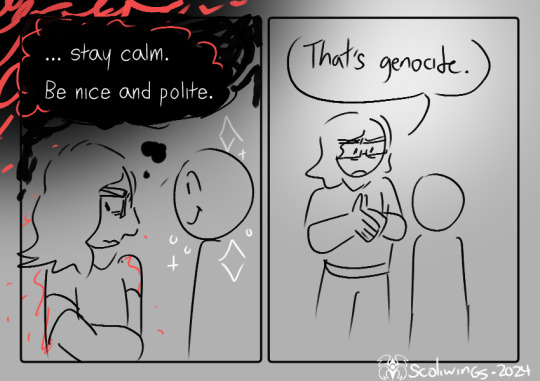
"What if you were cured?"
This is a question I get a lot, usually after sharing that I am deaf and I do not speak English. Deaf people get this in general. We've likely been asked this thousands of times in our lifetimes.
Most people treat it as a casual, sometimes playful question. Like it's something that would have a "why, yes, I'd love to be hearing!" answer. As if it's obvious that everyone who's ever deaf or disabled should simply choose to be abled. As if it's even remotely easy to get that kind of treatment, to simply learn a language you've never even heard, to simply have your ears altered to take on a small, artificial fraction of the full range of hearing people have.
I've been asked that question so much that it all sounds like "Why don't you just die?" to me.
I'm used to shrugging it off and I constantly educate people about deaf culture and accessibility and why these kinds of questions are wrong. Now, I'm surrounded by people who defend me if this is asked. It's a nice balm to the decades of isolation and pain I've been through, particularly when I rarely find any deaf people online or in person.
#comic#our art#wingmate talks#vent#deaf#deafness#deaf culture#i know i wasn't going to post much art here because of all the AI fucking bullshit#but this should be here#also i'm NOT going to explain this time how this is wrong.#please look up this kind of stuff. i'm so tired.#i wanted to draw more optimistic comics before this but#well. here we are
49 notes
·
View notes
Text
Writing ASL: Techniques to Write Signed Dialogue
Hey, guys! I've been reading a lot of DC Batfamily fanfiction lately, and in doing so I realized how little I see of ASL being represented in written text (love you, Cass!). I wanted to briefly talk about tactics to writing American Sign Language (ASL), and ways that these techniques can help improve your writing in more general contexts!
SOME THINGS BEFORE WE GET STARTED
I will be discussing everything in terms of ASL! If you have a character who uses Chinese Sign Language or even British Sign Language, the same rules will not necessarily apply! Don't be afraid to do some extra research on them.
Do not let this dissuade you from writing a character who signs ASL! This is by no means the end-all be-all to writing ASL dialogue, and I do not intend this post to insinuate that by writing ASL the same way you write English you are deeply offending the Deaf community. If this is something you're interested in though, I highly recommend experimenting with the way you write it! Above all, have fun with your writing.
Related to 2nd rule, but still very important: not everyone will agree that sign language should be treated/written any differently than English. This is a totally valid and understandable stance to take! I do not hope to invalidate this stance by making this post, but rather to introduce an interested audience to how ASL operates in the modern world, and how that can be translated into text.
ADDRESSING SOME MISCONCEPTIONS
ASL is the same as English, just with gestures instead of words.
Actually, no! There is a language that exists that is like that: it's called Signing Exact English, and it's an artificial language; i.e., it did not come about naturally. All languages came from a need to communicate with others, and ASL is no different! It is a language all on it's own, and there is no perfect 1:1 way to translate it to English, just as any spoken language.
2. But everyone who signs ASL knows how to read English, don't they?
No, actually! Because it's a completely different language, people who sign ASL and read English can be considered bilingual: they now know two languages. In fact, fingerspelling a word to a Deaf person in search for the correct sign does not usually work, and is far from the preferred method of conversing with Deaf people.
3. Because ASL does not use as many signs as we do words to articulate a point, it must be an inferior language.
Nope! ASL utilizes 5 complex parameters in order to conversate with others: hand shape, palm orientation, movement, location, and expression. English relies on words to get these points across: while we may say "He's very cute," ASL will sign, "He cute!" with repeated hand movement and an exaggerated facial expression to do what the "very" accomplishes in the English version: add emphasis. Using only ASL gloss can seem infantilizing because words are unable to portray what the other four parameters are doing in a signed sentence.
4. Being deaf is just a medical disability. There's nothing more to it.
Fun fact: there is a difference between being deaf and being Deaf. You just said the same thing twice? But I didn't! To be deaf with a lowercase 'd' is to be unable to hear, while being Deaf with an uppercase is to be heavily involved in the Deaf community and culture. Deaf people are often born deaf, or they become deaf at a young age. Because of this, they attend schools for the Deaf, where they are immersed in an entirely different culture from our own. While your family may mourn the loss of your grandfather's hearing, Deaf parents often celebrate discovering that their newborn is also deaf; they get to share and enjoy their unique culture with their loved one, which is a wonderful thing!
YOU MENTIONED ASL GLOSS. WHAT IS THAT?
ASL gloss is the written approximation of ASL, using English words as "labels" for each sign. ASL IS NOT A WRITTEN LANGUAGE, so this is not the correct way to write it (there is no correct way!): rather, it is a tool used most commonly in classrooms to help students remember signs, and to help with sentence structure.
IF THERE'S NO CORRECT WAY TO WRITE IN ASL, THEN HOW DO I DO IT?
A most astute observation! The short answer: it's up to you. There is no right or wrong way to do it. The longer answer? Researching the culture and history, understanding sign structure, and experimenting with description of the 5 parameters are all fun ways you can take your ASL dialogue to the next level. Here are 3 easy ways you can utilize immediately to make dialogue more similar to the way your character is signing:
Sign languages are never as wordy as spoken ones. Here's an example: "Sign languages are never wordy. Spoken? Wordy." Experiment with how much you can get rid of without the meaning of the sentence being lost (and without making ASL sound goo-goo-ga-ga-y; that is to say, infantilizing).
Emotion is your friend. ASL is a very emotive language! If we were to take that sentence and get rid of the unnecessary, we could get something like "ASL emotive!" The way we add emphasis is by increasing the hand motion, opening the mouth, and maybe even moving the eyebrows. It can be rather intuitive: if you mean to say very easy, you would sign EASY in a flippant manner; if you mean to say so handsome, you would sign handsome and open your mouth or fan your face as if you were hot. Think about a game of Charades: how do you move your mouth and eyebrows to "act out" the word? How are you moving your body as your teammates get closer? There are grammar rules you can certainly look up if you would like to be more technical, too, but this is a good place to start!
Practice describing gestures and action. ASL utilizes three dimensional space in a lot of fun and interesting ways. Even without knowing what a specific sign is, describing body language can be a big help in deciphering the "mood" of a sentence. Are they signing fluidly (calm) or sharply (angry)? Are their signs big (excited) or small (timid)? Are they signing rushedly (impatient) or slowly? Messily (sad) or pointedly (annoyed)? Consider what you can make come across without directly addressing it in dialogue! Something ese about ASL is that English speakers who are learning it tend to think the speakers a little nosy: they are more than able to pick up on the unsaid, and they aren't afraid to ask about it.
Above all, don't be afraid to ask questions, do research or accept advice! New languages can be big and scary things, but don't let that make you shy away. Again, there is nothing wrong with deciding to write ASL the same as you write your English. I've personally found that experimenting with ASL dialogue in stories has aided me in becoming more aware of how to describe everything, from sappy emotional moments to action-packed fighting scenes. Writing ASL has helped me think about new ways to improve my description in more everyday contexts, and I hope it can be a big help to you as well, both in learning about Deaf culture and in pursuing your future writing endeavors. :)
P.S: I am quite literally only dipping my toes into the language and culture. I cannot emphasize how important it is to do your own research if it's someting you're interested in!
P.P.S: I want to apologize for my earlier P.S! What I meant by “I am … dipping my toes into the language and culture” was in direct regards to the post; what I should have said is “this post is only dipping its toes into the language and culture.” While I am not Deaf myself, I am a sophomore in college minoring in ASL and Deaf Culture, and I am steadily losing my hearing. Of course, that does not make me an authority figure on the topic, which is why I strongly encourage you to do your own research, ask your own questions, and consult any Deaf friends, family, or online peers you may have.
#dc batman#batfamily#cassandra cain#ASL#american sign language#deaf#deaf culture#tayscreams#writing advice#writing
3K notes
·
View notes
Text
if you want to learn sign language of any kind your one and only reason for it should be proper person to person communication. not because it's "so beautiful", not so you can talk shit and nothing else, not so you can say swear words without other people knowing.
if you're learning sign language your one and only reason should be to communicate with people who use sign language. learning sign language means learning about an entire complicated, extremely important culture and the people who are a part of that culture.
you can not learn sign language without learning about d/Deaf culture in depth. it also means learning to stay in your lane on d/Deaf issues. learning sign language and learning about d/Deaf culture does not mean you get to speak on d/Deaf issues, and a lot of hearing people don't realize that.
this has been a notice from a d/Deaf person
#just a few things to keep in mind#♤— ash tries#d/Deaf#deaf#deaf community#deaf culture#hoh#hard of hearing#sign language#american sign language#hearing loss#hearing aids#cochlear implant
796 notes
·
View notes
Text
People whose language is Sign have had to fight for acceptance from within the confines of a language that their opponents do not understand; they could not explain what they wanted until they got it. This has created an intense anger that subtends Deaf politics. The Deaf psychologist Neil Glickman has spoken of four stages of Deaf identity. People start out pretending to be hearing, with the discomfort of the only Jew in the country club or the only black family in the suburb. They progress to marginality, feeling they are not a part of either deaf or hearing life. Then they immerse themselves in Deaf culture, fall in love with it, and disparage hearing culture. Finally, they achieve a balanced view that there are strengths in both the deaf and the hearing experience.
Far From the Tree, Andrew Solomon. (2012)
The parallels here to other forms of identity adopted separately from parents, as this book focuses on generally, are incredibly vivid.
I have often idly thought that the intense sex repulsion you sometimes see in people who have newly found asexual communities after years or decades without the concept is part of a similar trajectory, for example. I also often see queer people more generally following this trajectory, and autistic people as well. This is a process for a lot of folks who find community only after a period of isolation among only people who don't share their own experiences.
It's something that should be, I think, gently handled with care and compassion by the communities receiving the person on a new journey to balance: let the person express their feelings and pain, like draining an abscess that has been full of pus for a long time, but make sure that the abscess is opened to the air and stays open so no new infections can fester while it heals. That is: gently keep the mind open if it tries to close around this new dichotomy of value, but don't be too startled or panicked about ugliness welling forth when the abscess is first breached. It will, with supportive care, drain and heal from the heart outwards as the angry irritation fades.
204 notes
·
View notes
Text
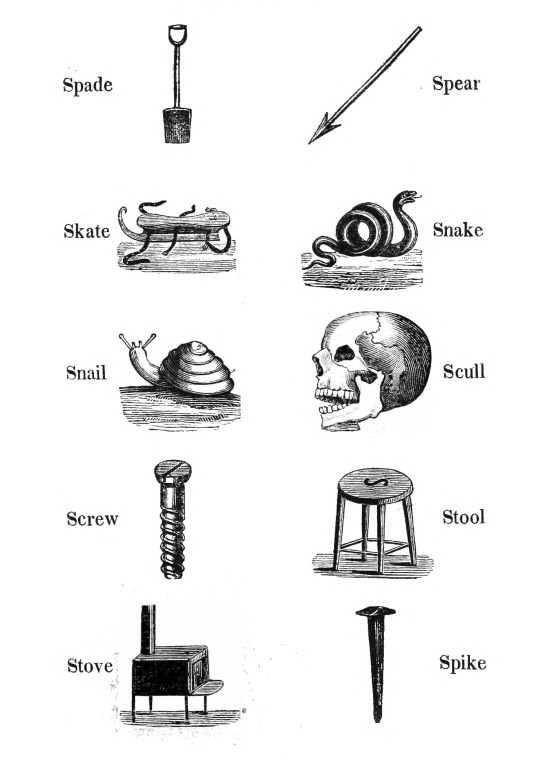
S words. Elementary exercises for the deaf. 1821.
Internet Archive
376 notes
·
View notes
Text
instagram
Guys, the Delaware ACLU is trying to push oralism-first in Deaf education. PLEASE sign this petition to stop that. The U.S. has a bad history with oralism based in eugenics beliefs and attempted cultural genocide. Please help preserve access to American Sign Language for Deaf students in Delaware.
Here's where you can sign the petition.
UPDATE: The Delaware ACLU is reviewing their claim. Their new petition claims that they don't support any form of education that limits access to American Sign Language. They reference the backlash from the Deaf community and the influx of complaints they've received in part of their decision to review the lawsuit. Thanks so much to everyone who signed!
218 notes
·
View notes
Text
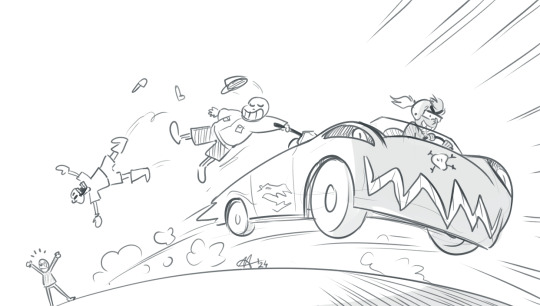
I'm officially done with driving school and time to try flight thing :> Once again, it's a proof that deaf people can do that. Hearing isn't really required to prove our ability. What Papyrus said: "Believe in yourself!"
On the other hand I still feel a bit disconnected with my Timetale comic, so it will take some time to regain strength to continue it x'D A life sacrifice was necessary but worth it.
127 notes
·
View notes
Text
Saturday, September 23.
International Day of Sign Languages.
It is Saturday, September 23, but it is no mere Saturday, September 23. It is International Day of Sign Languages, no less. This one is for the deaf community, the hard of hearing the mute, the semi-speaking, the hearing impaired. For all those, in fact, under this wide and vibrant umbrella, we wish you a very happy IDSL, today and every day.
The day's commemoration, in a nutshell, via the United Nations:
The International Day of Sign Languages is a unique opportunity to support and protect the linguistic identity and cultural diversity of all deaf people and other sign language users. During the 2023 celebration of the International Day of Sign Languages, the world will once again highlight the unity generated by our sign languages. Deaf communities, governments, and civil society organizations maintain their collective efforts - hand in hand - in fostering, promoting, and recognizing national sign languages as part of their countries’ vibrant and diverse linguistic landscapes.
Wishing you a happy celebration folks across Tumblr's rich and talented sign language community. Thank you, folks, and enjoy the weekend.
#today on tumblr#deafawareness#deaf#deafculture#deafpride#deaf culture#deaf community#ASL#sign language#hard of hearing#hearing impaired#hearingloss#deafness#IDSL#mute#mute community#semi speaking
354 notes
·
View notes
Text
so I've just realised that the hearing community might not be aware of the genius cult film that is Deafula. I watch it every Halloween, but apparently this is not something hearies do.
Do you need to watch a ridiculous cult movie entirely in American sign language about a Deaf vampire and motorbikes? Yes. Yes, you do.
youtube
#deafula#yes i said deafula#asl#sign language#sign language films#films entirely in ASL#halloween films#deaf vampire#deaf culture#Youtube#hearies vs deafies
153 notes
·
View notes
Text
comic i made about interacting with someone who is hard of hearing :P formatting is probably weird, sorry!
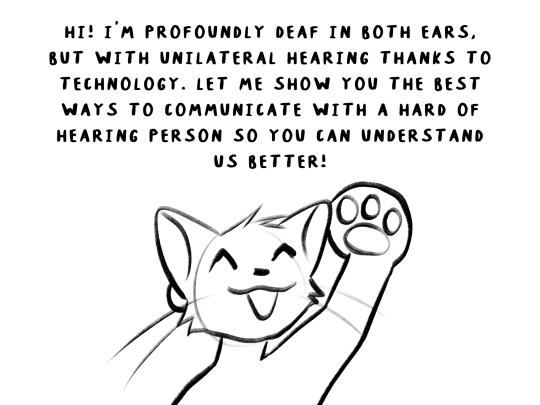
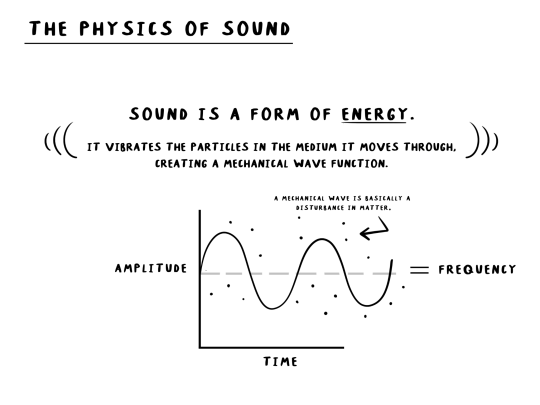
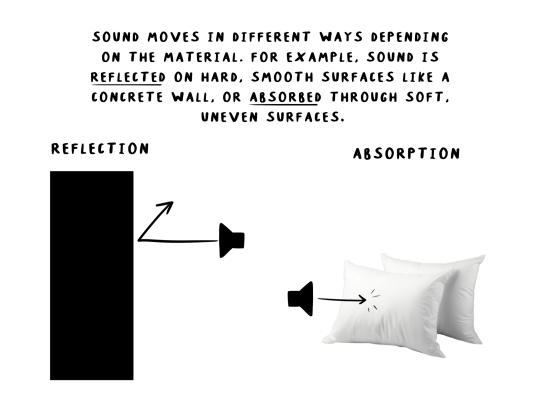
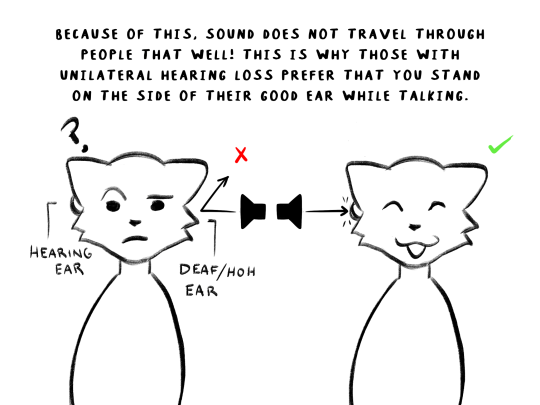
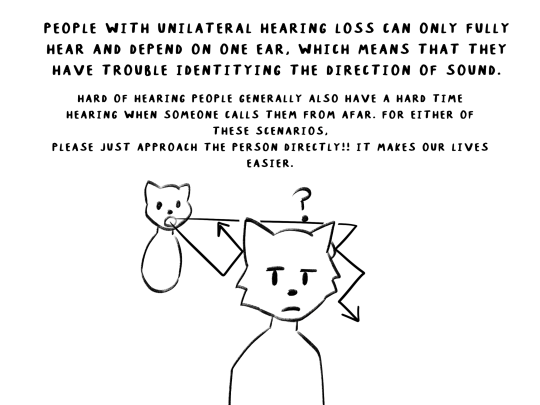
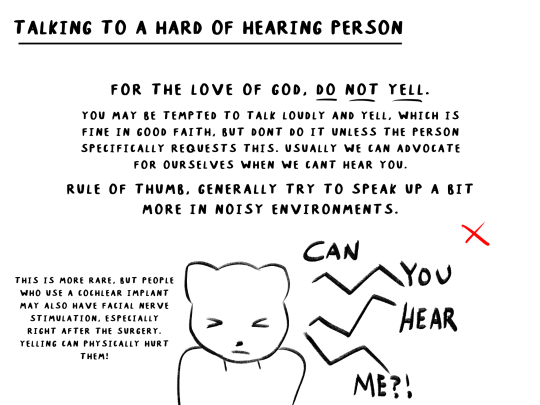
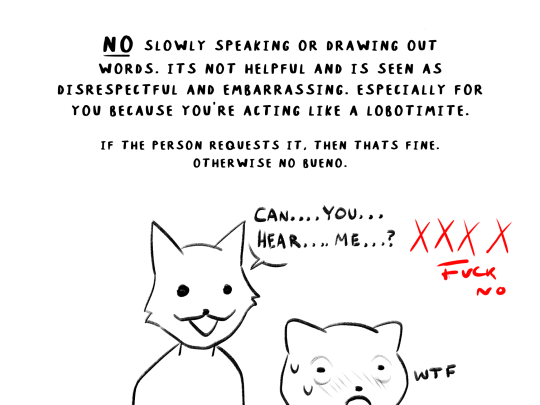

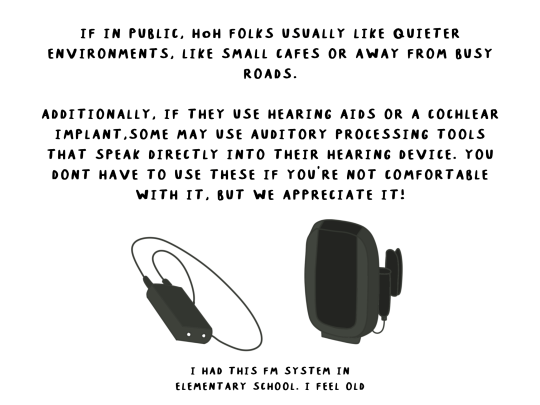
#deafawareness#deaf#deaf culture#deaf character#deaf community#cochlear implant#anthro art#art#artwork#digital art#furry#my art#furry art#original character#furry anthro#anthro
29 notes
·
View notes
Text
sometimes being Deaf is good - tuning out annoyances, less auditory distractions (depending on how severe your hearing loss is), cool-looking hearing aids
but sometimes it's Not Good - the repetition of questions, mocking of asl, being constantly behind, expenses of accommodations, and listening fatigue, to name a few
and yet despite all of that, i wouldn't trade being Deaf for anything else in my life
if you are ableist or otherwise disapproving of Deaf/hard of hearing people, harassment on this post will not be tolerated, and you will be reported and blocked
35 notes
·
View notes
Text

Deaf, Chronic Pain, and Little Birds based Demibisexual moodboard~ ^^
For an anon, hope you like how this looks!!
Want one? Send an ask! -mod Jay
#deaf#deaf aesthetic#deaf culture#hoh#disability#disability aesthetic#chronic pain#little birds#bird#birds#birds aesthetic#bird aesthetic#little birds aesthetic#demi#demisexual#demi pride#acespec#acespec pride#bi#bisexual#bi pride#edits#lgbtqia#lgbt#lgbtqa#flag edit#pride#pride flag edit#pride flag edits#flag edits
21 notes
·
View notes
Text
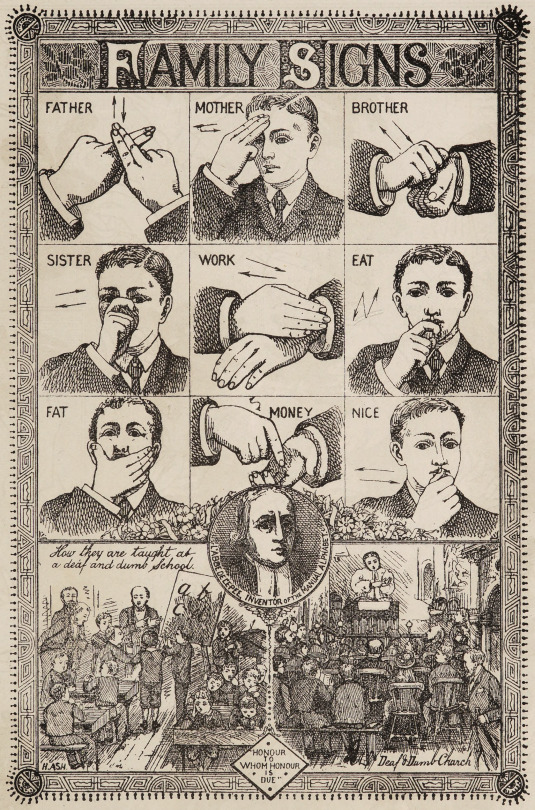
Family signs. The book of...signs. n.d.
Internet Archive
186 notes
·
View notes
Text
Writing Signed Languages in Fanfics
so i recently got into learning ASL (which is amazing!! i love it so much!!) and am planning to reference it when writing a Legend of Zelda fanfic, like certain facial expressions or how quickly/forcefully a sign is made, etc.
the thing is, since i'm hearing, i'm wondering if those of you who are d/Deaf or HoH can give me some tips on how to write a signing character, like things you wish you'd see in fanfics, or things you wish writers would stop doing.
also, to show that the MC is communicating in another language other than English, i'm thinking of using these Japanese 「quotation brackets」. thoughts?
#american sign language#asl#sign language#bsl#auslan#british sign language#Australian sign language#deaf culture#actually deaf#actually hoh#<- plz lmk if i should remove the last tags--i just want this to be seen#as an audhd person i'm fine with ppl using the audhd tags to get our attention but idk if y'all are cool w that so plz kindly lmk if not!#reyna's ramblings
83 notes
·
View notes
Text
Survey Announcement!
Translation:
"Hello, my name is Moth. I am a college student studying research. For my class, I picked information access for the d/Deaf community. Below this video is a link to my survey. If you could complete my survey, I'd be happy. Thank you."
Specifically, I'm interested in accessibility of American news organizations. For more information and to take the survey, please follow the link below. I would appreciate the help so much!
If you have any questions, please reach out to me!
This survey will close April 9th, 2023.
#deaf#deaf and hoh#asl#american sign language#deaf community#deaf culture#information accessibility#journalism and mass communication#media bias#journalism
196 notes
·
View notes
Text
When hearing people find out that only like, a 1% of hearing parents of deaf and hoh children actually learn to sign for them, and that even then most of those that do learn, only learn "the basics", aka a few signs related to domestic life without any type of structure or grammar, just single signs here and there, and they start this whole fucking scene where they act like their entire world is ending and they cry and shout and act all indigned and HOW CAN THEY??? That is so so ugly and sad!! Just so sad :(:(:(:(
And they basically just expect you to consolate them and promise that yes, you know they won't ever do something like that (even tho they don't even have the decency to repeat themself when you ask them to. Or look at you when they speak. Or do anything to make communication easier. And you KNOW they would do exactly the same thing that 99% of hearing parents do) And you have to smile and nod and say yes, yes it's a terrible thing and then you have to start laying in front of them your whole D/deaf /hoh childhood story and give them a detailed presentation on your relationship with your parents because they won't stop asking so they can keep pretending they could not even fathom it was this bad, and pity you and go tell their friends how sad this all is :( and how they are gonna go save the Deaf!! And that they will learn to sign and be the hero we were expecting all along...and then they just
Don't even learn how to say "good morning"
Or properly communicate with us
Or even just listen to us so they are not this misinformated or ignorant to Deaf issues
Or even just
I don't know, try
#deaf#hard of hearing#hoh#actually hoh#sign language#actually deaf#actually disabled#actually hard of hearing#deaf issues#deaf culture#deaf community#deaf awareness#deafness#asl
163 notes
·
View notes